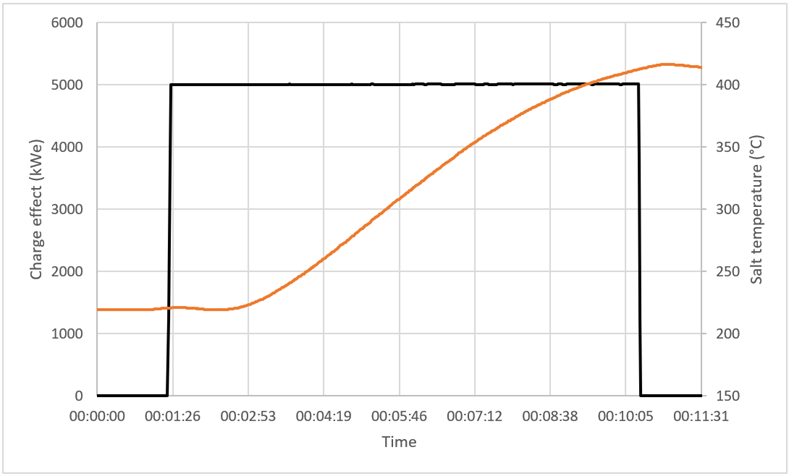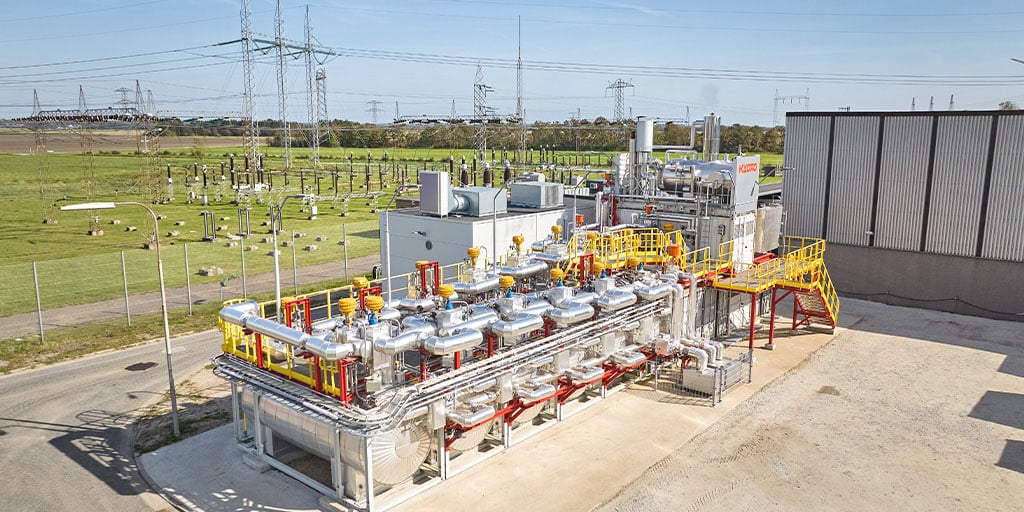Oslo, Norway 22 November 2023 – Kyoto Group is thrilled to announce that the Heatcube at Norbis Park (Nordjylland Power Station) in Aalborg, Denmark, has passed the Power Market Test required to provide flexibility services to the electricity market in the DK1 grid area.
By proving a fast and reliable charging response, Kyoto’s Heatcube at Norbis Park successfully passed the Power Market Test required to qualify for participation in the balancing market in DK1. This will enable Nordjylland Power Station to utilize the aFRR and mFRR market to minimize the price of electricity, which subsequently ensures the lowest cost of heat possible from Heatcube, for their customers.
Energinet, the independent public enterprise owned by the Danish Ministry of Climate, Energy & Utilities responsible for owning, operating, and developing the electricity transmission system in Denmark has now approved the results of the test conducted by the Kyoto team in collaboration with key employees from Norbis Park and accepted Heatcube as a provider of flexibility services for the DK1 grid.
The power market test confirmed Heatcube’s operational performance, successfully achieving a smooth and dependable ramp-up of the heater from 0 MW to 5 MW in 90 seconds, well within the requirements for the balancing market participation in question.
Heatcube consistently operated well and above its designated design parameters, demonstrating its stability and reliability. Please refer to the graph below for a visual representation of the test results, ramping up to, holding and down from 5 000 kWe (5 MW) for approximately 10 minutes during the 15 min test.

Figure 1 – The black line shows the charge effect delivered by the heater as a function of time and the orange line shows the outlet temperature of the molten salt from the electrical heater as a function of time.
The test was executed by giving a start signal for activation, whereafter the battery management system automatically aligned the valves for charging. The pump was then activated, and when steady flow was achieved, the heater swiftly ramped up to 5MW load within seconds.
The complete activation sequence happened within 90 seconds. The heater stayed at a stable level of 5MW for approximately 10 minutes, whereafter the load of the heater was ramped down to 0 MW, the pump was turned off and the valves automatically closed.
The deactivation also happened within 90 seconds, and the system was seamlessly brought to standby mode. Throughout the test, the outlet temperature of the molten salt from the electrical heater smoothly increased from 220°C to a maximum of 415°C.
“We are proud of our offering of flexibility services to the electricity market, which will be a critical component of the energy market going forward, when intermittent renewable energy will dominate the supply side of the global energy system. With Heatcube, Kyoto can provide a balancing asset for the grid operators while at the same time providing heat at the lowest cost possible for our customers,” says Bjarke Buchbjerg, CTO of Kyoto Group.
By proving this first-of-its-kind capability towards the electricity market, Kyoto presents a truly unparalleled and validated technology. This innovation can simultaneously decarbonize industrial process heat, tap into the most cost-effective or even cost-free electricity sources, and sometimes even generate revenue by providing reliable, on-demand heat for industrial decarbonization.
"We are excited by the prospect of integrating Heatcube into the power market. The successful test has unequivocally demonstrated the technical readiness and capabilities of this unique technology,” says Søren Gais Kjeldsen, CEO of Aalborg Forsyning.
The Heatcube installed at Nordjylland Power Station has a storage capacity of 18 MWh and a discharge capacity of 4 MW. It serves as a heat storage system, absorbing power from the electrical grid, storing thermal energy in molten salt and delivering heat to the district heating system, making solar and wind a viable alternative to fossil fuels for district heating.
“This achievement displays the effectiveness of our thermal energy storage technology and paves the way for a future where industrial process heat is sourced from clean, renewable electricity, enabling the industry to finally decarbonize while optimizing its operational expenses. We are proud to lead the change towards a greener future,” says Camilla Nilsson, CEO of Kyoto Group.
For further information, please contact:
Håvard Haukdal, Kyoto Group CFO
havard.haukdal@kyotogroup.no
+47 48 10 65 69
About Kyoto Group
Heat accounts for two thirds of industrial energy consumption. Traditionally, nearly all of it is based on fossil fuels. Kyoto Group's Heatcube, a thermal energy storage (TES) solution, provides a sustainable and cost-effective alternative by capturing and storing abundant but variable energy from sources such as solar and wind. Founded in 2016, Kyoto Group is headquartered in Oslo, Norway, and has subsidiaries in Spain and Denmark. The Kyoto share is listed on Euronext Growth (ticker: KYOTO).
About Aalborg Forsyning
Aalborg Forsyning is one of Denmark’s largest utility companies supplying the greater Aalborg area with water, district heating, cooling, gas, and disposal of wastewater. Aalborg Forsyning is in the middle of an ambitious green transition phasing out the use of coal at the power plant, Nordjyllandsværket, and introducing new green technologies in replacement.
About Norbis Park
Aalborg Forsyning is creating a new district with a green test center at Nordjylland Power Station called Norbis Park where new, green technologies can be developed and tested. The proximity to green electricity and heat production and CO2-containing waste gas offers excellent conditions for utilizing resources that would otherwise go to waste.


